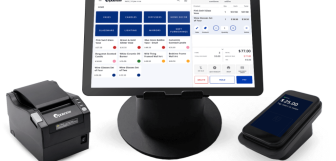Best POS System for Small Business: A Comprehensive Guide
Let’s be real— a point of sale (POS) system does way more than just swipe your card (or tap, if you’re fancy). The best ones are like your personal assistant, but better—they can handle everything from juggling employee schedules to keeping tabs on inventory and even wooing your customers with loyalty programs (I mean, who doesn’t love a good loyalty program?) But finding the one—the perfect POS—is no walk in the park. That’s why we went full nerd and looked into seven different providers to bring you the ultimate guide to the best POS systems for small businesses in 2024. You’re welcome.
Essential features to consider
So what do you need to be looking out for when choosing a POS system for your business? Here’s what:
Inventory management
You’ve got a lot on your plate, and manually carrying out inventory tracking shouldn't be one of those things (seriously, who’s got time for that?) A solid small business POS system should have built-in inventory management that’s smart enough to let you know when you're running low on that best-selling item. Automatic updates? Yes, please! Restocking becomes less of a hassle for small business owners, and no more guessing games.
Payment processing
Obviously, this is what you need your small business POS system to do—process payments like a champ. Think mobile payments, contactless payment options, and even gift cards. Bonus points if the processing fees are low and it handles multiple payment methods at once without giving you or your customer a headache.
Data analysis and reporting
Knowledge is power, and a good POS system serves up the data like it’s a hot meal. Sales trends, best-sellers, peak hours—all those juicy insights that can help you make better business moves. And those functional reports should be clear, easy to understand, and not look like something you’d need a degree to figure out.
eCommerce Integration
If your business operates both online and offline, your POS system for small business has to keep up with the times. The best POS systems will seamlessly sync your in-store sales with your online sales, so you never accidentally sell the same item twice. Whether you're running an online store or accepting in-person sales, you want a POS system that effortlessly connects your multiple sales channels—retail stores, online ordering, and everything in between. With Shopify POS and other cloud-based POS systems, managing inventory and transactions across multiple locations is easy, helping you keep track of your stock and sales data like a pro.
Other app integrations
In an ideal world, your POS system should play nice with your favorite software tools—whether it’s accounting software, customer relationship management tools (CRM), or that app you use to manage employee schedules. Because, let’s be real, pen and paper are so 2005.
The best POS software for small businesses integrates with inventory management tools, payment processing, and other essential apps, creating a streamlined operation for small business owners. Whether you’re in retail or the food and beverage industry, your POS solution should be the ultimate team player, offering advanced features that help with everything from barcode scanners to sales trends analysis and customer loyalty programs.
A good POS platform will help you grow your business by tracking customer data and offering insights through detailed sales reports—all while reducing those pesky transaction fees and payment processing fees.
Industry specific POS systems
Not all POS systems are the same. Some are versatile, while others are laser-focused on meeting the exact needs of your industry. Let’s break it down.
Hospitality POS systems
When you’re in hospitality, things need to move fast and smoothly—no hiccups allowed. Here's what your hospitality POS system should do for you:
- Table management: Easily assign tables, split checks, and move orders around without breaking a sweat.
- Mobile ordering: Take orders right from the table and send them directly to the kitchen. No more human error and endless paper tickets!
- Real-time inventory tracking: Know when you’re about to run out of those famous fries before your customers do.
- Payment flexibility: Split bills, handle tips, and accept everything from credit cards to mobile payments.
- Loyalty programs: Keep regulars coming back with easy-to-manage rewards and discounts.
- Integration with delivery platforms: For when your customers want their burgers to-go without leaving the couch.
Retail POS systems
Running a retail business? You need a POS system that can handle everything. Here’s what a retail POS system should bring to the table:
- Inventory tracking: Keep tabs on stock across multiple locations, so you’re never caught empty-handed.
- eCommerce integration: Sync your online store with your in-person sales seamlessly.
- Customer management: Track purchase histories, offer personalized discounts, and build customer profiles.
- Sales data analysis: Get detailed reports on what’s flying off the shelves and what’s gathering dust.
- Multiple payment methods: Whether it’s cash, card, mobile payments, or gift cards—your POS should handle it all.
- Barcode scanners: Speed up checkout and make sure no items are missed, even during the holiday rush.
- Employee management: Schedule shifts, track hours, and assign permissions all in one place.
Top POS system providers for small businesses
Now that you've got a decent idea of what to look for, let's talk about some of the MVPs in the POS provider game.
Epos Now
Epos Now's POS terminals are quickly becoming a big deal in the world of cloud-based POS systems. It’s got everything you need to run your business, from loyalty programs and online ordering to keeping your staff in check and tracking inventory. The best part? It’s incrediblyeasy to use—you’ll have it set up in minutes. Oh, and it’s got top-notch security to keep your data safe, too.
Founded back in 2011 by Jacyn Heavens, Epos Now was born out of Jacyn’s frustration when he was working at a bar and couldn’t find a decent POS system that wasn’t ridiculously overpriced or impossible to use. So, he made his own. Fast forward to now, and Epos Now's retail POS systems and hospitality POS systems are available in the UK, US, Canada, Australia, and more, helping businesses all over the world streamline their operations.
- Integrated payment processing: One of Epos Now’s coolest features is its integrated payment system - Epos Now Payments. You can take all kinds of payments through one terminal, which speeds things up and reduces mistakes. Plus, you get fixed-rate payment processing with no surprise fees, so managing costs is a breeze.
- Inventory tracking: The cloud-based inventory tracking is chef’s kiss. You can see what’s in stock in real-time, set up notifications when you’re running low, and even automate reorders so you never run out of your top sellers.
- Employee management: Managing your crew is easy with their tools for scheduling and time tracking. You’ll always know who’s working when, and there are alerts to help your team hit sales goals. And with customizable permissions, only the right people get access to sensitive info.
- App store: Want more features? Head to the Epos Now AppStore, where you can add a bunch of cool apps like:
- Epos Now Loyalty: Set up and manage loyalty programs for your customers.
- Epos Now Delivery: Make delivery orders super smooth.
- Order & Pay: Let customers order and pay straight from their phones.
- QuickBooks: Sync up your sales and finances without lifting a finger.
- Mailchimp: Automate your email marketing campaigns like a pro.
At the end of the day, Epos Now is perfect for business owners who want a simple, secure POS systems for small businesses that’s packed with features. With integrated payments, real-time, built in inventory management system, and easy employee management, it’s everything you need to run things smoothly. And if you hit a snag, their customer support team is always ready to help.
Everything in one package
Our POS system enables you to adapt, gain new customers, increase profit and remain future proof.
- Set up, onboard, and train staff in minutes
- Online, delivery, collection, and multi-channel ready
- Access your business insights through any device, on-the-go
- Real-time reporting on staff, customers, sales, margin and stock
- Use standalone, or connect to hundreds of apps including payment systems, accounting software and much more
Get everything you need to trade in one system, including POS terminal, built-in printer, and card machine.
Square
Next up is Square POS, a cloud-based system with a range of features. It’s got mobile payment processing and tools for managing staff and customers. It gives detailed reports and integrates with major accounting systems.
According to Forbes, here’s the lowdown on the pros and cons:
Pros:
-
Free to start: Square POS allows you to get started for free.
-
No monthly fees (basic plan): The basic plan has no monthly fees.
-
Tons of hardware options: Square’s has a range of hardware choices.
Cons:
-
Account freezing: Your account can get frozen if Square spots anything weird.
-
Not great for high-volume transactions: If you’re doing a lot of transactions, Square’s fees can add up fast, making it less cost-effective.
-
No phone support: Square doesn’t offer phone support, which can be frustrating when you want to speak to a real person and not a robot.
Shopify
Shopify POS is another alternative. It integrates with Shopify’s online store platform to manage your sales, inventory, and customer data all in one place.
Here’s the 411 from Forbes:
Pros:
-
Syncs with your online Shopify store: Connect your online and in-person sales.
-
Comes with Shopify online store plan: You get Shopify POS as part of your online store plan.
-
Offline mode for cash transactions: No internet? You can still handle cash sales.
Cons:
-
Not free without a paid Shopify plan: You’ll need a Shopify website plan to use POS, so it’s not available for free on its own.
-
Advanced features are expensive: Some of the more advanced features can get pricey.
-
Free trial cut down: The free trial is now just three days, a drop from the previous 14-day trial, so you’ve got less time to test it out.
Clover
Clover is another of the alternative small business POS systems. It’s got a bunch of POS software and POS hardware options for retail shops, a restaurant, or providing services. It’s not the cheapest option but its list of payment partners may make it worth considering.
Here’s what Forbes had to say:
Pros:
-
Competitive pricing: It’s competitively priced.
-
Free 30-day trial: You can try it out for a month at no cost before committing.
-
Low-cost hardware: Hardware starts at just $49.
-
Feature range: It has features to cover many business needs.
Cons:
-
Online application not available: You can’t sign up online—you’ll need to go through a sales rep.
-
Pricing details are not transparent: You might need to dig a bit to get the full picture.
-
No free plan: There’s no free version available, so you’ll need to pay to get started.
Lightspeed Retail
Lightspeed is another option for a range of different businesses. You can run it on the cloud, through your browser, or with the iOS app.
Here’s what Forbes had to say about Lightspeed:
Pros:
-
24/7 support: Help’s available around the clock to deal with problems.
-
Account manager: Customers get a dedicated account manager.
-
Inventory management: Good stock management options.
Cons:
-
Pricey: It’s a bit on the expensive side compared to other POS options.
-
Long contracts: Once you’re in, you’re locked in with those long agreements.
-
Hard to cancel: Breaking up with Lightspeed can be a bit of a headache.
Toast
Toast is aimed very much at restaurant owners. It handles payments, tracks inventory, and manages teams, promo codes and gift cards.
Here’s what Forbes had to say about Toast POS:
Pros:
-
Multiple payment methods: Accepts most kinds of payment, from credit cards to mobile payments.
-
Restaurant-specific: Built with the restaurant industry in mind.
-
24/7 customer service: Toast’s support team works on problems around the clock.
-
Easy multi-location use: Toast can work across multiple locations.
Cons:
-
Unclear costs: With scalable plans and pay-as-you-go pricing, figuring out exactly what you’ll end up paying can be a bit of a mystery.
-
Expensive to cancel or switch: If you need to change plans or cancel, it can get pricey.
-
Hospitality-specific: It’s tailor-made for the restaurant industry, so if you’re running a small retail business, you might find it’s not the best fit for your needs.
-
Poor BBB rating: The BBB rating isn’t great, and there’s not much online help for customer issues.
TouchBistro
For a POS system that’s made just for restaurants, TouchBistro is another option, rated for its reliability. Here’s the scoop from Forbes:
Pros:
-
Restaurant-specific features: It’s designed for the restaurant industry, from managing tables to handling orders.
-
Easy-to-use interface: The interface is straightforward and user-friendly.
-
Good integration with third-party apps: TouchBistro can integrate with accounting software and more.
-
Highly customizable: Users can customize it to fit specific needs and preferences.
Cons:
-
No free trial or free version: You’ll have to shell out some cash up front because there’s no free trial or free version to try out first.
-
Only works on Apple devices: If you’re not into Apple, you’re out of luck—TouchBistro only works on iOS devices.
-
À la carte pricing: Its à la carte pricing model can add up quickly.
Selecting the right POS system for your business
Choosing the perfect POS system can feel a bit like dating—you’ve got to find the one that’s right for you. It’s not just about the features. Nope, you need to think about how it fits your business now and in the future. Let’s break it down.
Cost
Let’s be honest, price matters. You want a system that gives you bang for your buck without bleeding your budget dry. Make sure you look at the full picture—not just the upfront cost but also any monthly fees, payment processing fees, and the price of POS hardware like KDS systems, PMS systems, tablets and barcode scanners. Watch out for sneaky transaction fees that can add up quicker than you'd think.Find a system that fits your budget but still gives you the advanced features you need.
Scalability
Planning on growing your business? Duh, of course, you are! Then you'll need a POS system that’s ready to scale with you. Whether you’re adding more locations, hiring staff, or expanding online, your POS should be able to handle the heat. Look for systems that support multiple business locations, can integrate with other tools like customer relationship management (CRM), and offer cloud-based solutions that let you manage everything from one dashboard—no matter how big you grow.
Ease of use
If it takes a PhD to run your POS system, it’s probably not the right one. A good POS should have an intuitive interface that’s simple to navigate, even if you’re not tech-savvy. Whether you’re ringing up customers, updating inventory, or running reports, the system should be fast, user-friendly, and not make you want to pull your hair out every time there’s a software update. The best POS systems keep things easy, so you can spend more time on the business itself—not fighting with your tech.
Customer support
When things go sideways—and let’s face it, tech isn’t perfect—you need a POS provider that’s got your back day and night. A good customer support team can be the difference between a quick fix and hours of frustration. Look for systems that offer 24/7 support, whether it’s through phone, chat, or email. Bonus points if they have a solid knowledge base or training videos for those times when you want to figure things out on your own. After all, you need a system (and support team) you can rely on when it matters most.
Conclusion:
So there you have it. Our complete guide on the best POS system for small business owners. You’re basically a POS expert now—congrats! Whether you’re slinging coffee, selling clothes, or managing a whole fleet of stores, the right system can make all the difference. Just remember: find one that fits your budget, grows with you, and keeps things easy. Now, go get that POS system and start making your life way simpler. You’ve got this!
Check out our additional competitor guides including:



